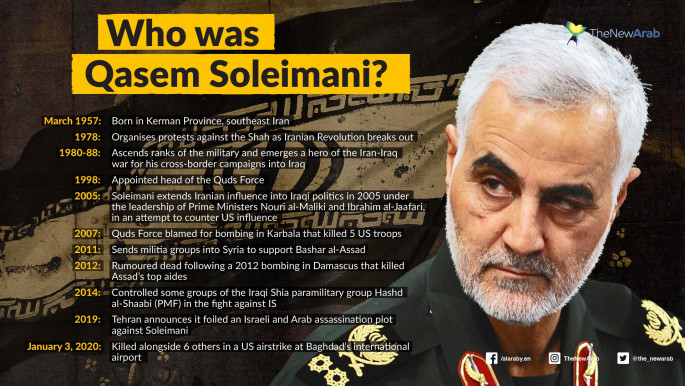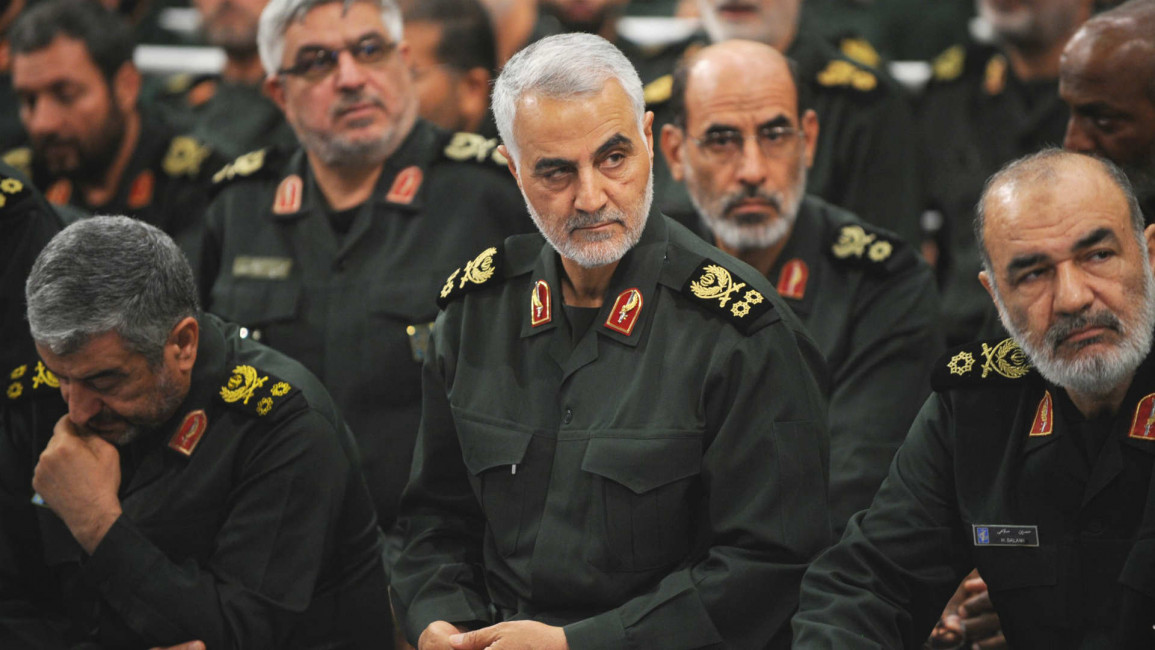
Soleimani assassination spells trouble for Iraqis, Iranians and the region
Also killed were six other militia leaders, including Abu Mahdi al-Muhandis, head of the pro-Iranian Iraqi militia Kataib Hezbollah, one of the largest component forces of Iraq's largely Iran-aligned Popular Mobilisation Units (PMUs).
The immediate US justification for the assassination was the recent attack on the US embassy by pro-Iran militia forces, which was widely seen as being devised by Soleimani. But, curiously, the Trump administration claimed the action was also about "deterring future Iranian attack plans" against the US.
Not only does the wording of the justification defy international law, but it makes no sense. The main victims of Soleimani, past, present and future, are people in the region, not Americans.
Soleimani garnered a brutally efficient reputation as the pioneer and de facto ruler of Iran's "sphere of influence" in Syria, Iraq and Lebanon. In Iran, he was considered to be perhaps the second most powerful figure in the country, behind the Supreme Leader Ayatollah Khamenei.
Among anti-Assad Syrians, Soleimani's role in the genocidal war to prop up Assad gained him the nickname 'the butcher of Syria', but in recent months his main role had been in brutally suppressing popular protests in Iraq.
 |
No one who has observed Soleimani's criminal activities in Syria or Iraq could possibly mourn him |  |
And this, it seems, became his ultimate undoing.
As popular protests gripped Iraq, with the protesters rounding on the Iraqi government and, in particular, growing Iranian influence over the country, Soleimani moved in to bolster the government and Iranian interests.
With protesters burning the Iranian consulate in Najaf, accompanied by chants of "Iran out, Iraq remains free", Soleimani's initial tactics ominously mirrored those his and Assad's forces used in the early stages of Syria's civil war.
Snipers deployed from any of Iran's multiple proxy militias shot innocents dead, while militiamen viciously targeted protesters in Baghdad's Tahrir Square. Hundreds of protesters were abducted, attacked and disappeared.
And this wasn't Syria. This wasn't a Sunni-majority country where the absurd lie could be sold that Iran was acting to stop the overthrow of an ostensibly Shia ally. In fact, the recent protests were remarkable precisely because of their cross-sectarian participation.
Instead, when Kataib Hezbollah killed an American civilian contractor on a US airbase in Iraq, the US responded with an airstrike that killed 25 members of the group. In retaliation, militia forces attacked the US embassy. The siege was supposed to be a rallying point to deflect anger from the Iraqi protesters away from Iran, and onto the US.
 |
|
| [Click to enlarge] |
But it didn't take long for the true character of the attack to emerge.
In stark contrast to the common refrain of Iraqi protesters against the Iranian regime, the chants at the US embassy were hugely pro-Iranian, such as "US out, Iran remains free". Most ominously, the "protesters" were chanting "Qassem Soleimani is our leader."
It's not hard to figure out the motivations of the Iranian regime; to try and cast the protesters' battle as one between Iran and the US.
Despite his many crimes across the region, Soleimani was considered by some in Iran as a national hero. His "martyrdom" at the hands of the US will only bolster this image, and will serve to further whitewash his various criminal acts across the region.
And this is where one must appeal to nuance. No one who has observed Soleimani's criminal activities in Syria or Iraq could possibly mourn him. But no one could reasonably argue that the killing of Soleimani in these circumstances is somehow a good thing for Iraqis, Iranians or, indeed, anyone in the region.
 |
In Iran, he was considered to be perhaps the second most powerful figure in the country |  |
Iran has vowed "severe revenge" for the killing of Soleimani, while its allies and proxy forces have essentially been put on a war footing. There will be a retaliation for his killing, the only questions are where, and when?
It's ironic that it was the US that engendered Iranian influence over Iraq, both in terms of its general post-war policy of supporting sectarian pro-Iran governments, and the immediate policy of working with pro-Iran militias in the fight against IS.
Now though, Obama's appeasement of Iranian aggression in both Iraq and, especially, Syria has been replaced with Trump's unpredictable and hugely irresponsible belligerence.
Only the worst apologists would portray Soleimani in the 21st century as anything other than an agent of repression in the region. But his own actions are to some extent matched by a Trump regime that cares nothing about international law, potential war crimes or the constitutional processes of its own country - never mind Iraqis.
The main focus in the aftermath of the killing will be on the prospect of the renewed chances of war between Iran and the US, with officials being urged to leave its embassy in Iraq. But many Iraqis understand that it's them who stand to lose the most from their country being used as a potential battlefield for two foreign powers.
| | |
Speaking under the condition of anonymity right after the assassination, an Iraqi government official told me that the fear was now that the pro-Iran militias will hold elements of the Iraqi security services and government guilty of cooperation in the assassination. These are the potential fault lines of a civil war.
An Iraqi protester I spoke to added that there was a real fear that the assassination would lead to "Iran becoming even more embedded … and doubling down on its control of [Iraq]".
Of course, Trump doesn't care about any of this - the killing of Soleimani will surely shore up his evangelical, pro-Israel and Islamophobic base in an election year.
This is perhaps the most tragic aspect of Trump's assassination of Soleimaini: Despite the US justifying the killing by absurdly claiming it will "deter further Iranian attacks", it could instead reinvigorate Iran in Iraq, at a time when criticism of its grip was gaining momentum through the protests.
The Iraqi protest movement had overwhelmingly disavowed the attack on the US embassy, making clear that the same forces attacking the US embassy were the ones who had attacked them.
 |
The main victims of Soleimani, past, present and future, are people in the region, not Americans |  |
Now the line of polarisation risks moving away from the protesters' demands for social justice, to one determined by a renewed pro-Iran/pro-US dichotomy. This time, however, it could lead to outright war – or, at least, a situation where Iran strikes back not directly at the US, but at any force deemed to be supportive of their interests.
Though there's no doubt Tehran is rattled by the assassination of Qassem Soleimani, it seems that once again the demands for Iraqi self-determination are being buried under the interests of foreign powers.
Sam Hamad is an independent Scottish-Egyptian activist and writer.
Join the conversation @The_NewArab
Opinions expressed in this article remain those of the author and do not necessarily represent those of The New Arab, its editorial board or staff.



